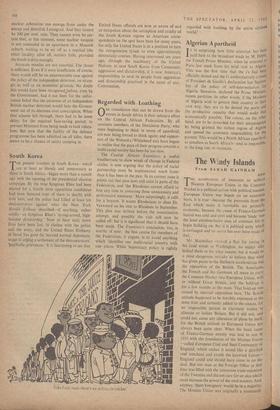South Korea
Tf IE present troubles in South Korea—which , . are at least as bloody and unnecessary as those in South Africa—began more than a month ago with the opening of the presidential election campaign. By the time Syngman Rhee had been elected for a fourth term opposition candidates had been battered (one of them to death) with iron bars, and the police had killed at least ten demonstrators against what the New York Herald Tribune described--if anything, rather mildly--as Syngman Rhee's 'strong-armed, high- handed dictatorship.' Now at least sixty more liVeS have been lost, in clashes with the police and the army, and the United States Embassy in Seoul has gone far beyond normal diplomatic usage in urging a settlement of the demonstrators' 'justifiable grievances.' It is heartening to see that
'Like I say, man, there's no politics in cricket.' United States officials are now as aware of and as outspoken about the corruption and cruelty of the South Korean regime as American corre- spondents on the spot have been for many years, for only the United States is in a position to turn the octogenarian tyrant to even approximately democratic courses. Having intervened ten years ago, through the machinery of the United Nations, to save South Korea from Communist aggression and dictatorship, it is now America's responsibility to save its people from aggression and dictatorship practised in the name of anti- Communism.










































 Previous page
Previous page